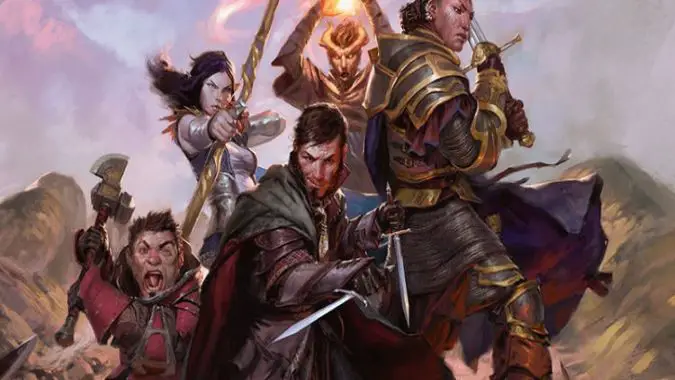What is Sage Advice and why it belongs in every D&D player’s toolkit

Nothing kills fun in a tabletop RPG faster than a rules argument. No one likes being wrong, and no DM truly likes being the bad guy. While the available rulebooks are comprehensive, there’s always enough ambiguity and sometimes outright contradiction that cries out for adjudication. And that’s where Sage Advice and its included errata comes in.
Cast your mind back to November 1979: Jimmy Carter is President of the United States, Donna Summer and the Commodores are at the top of the music charts, and issue 31 of Dragon Magazine is published, featuring the first ever Sage Advice column. Edited by Jean Wells and later the domain of the legendary Skip Williams (who would author it for over fourteen years), it would be a recurring feature through the next several decades of D&D publications, both physical and online.
In a pre-Internet world, Sage Advice was the only place to get your burning rules questions answered definitively, and even after the Internet provided communities where players could argue over interpretations, the column could be the final arbiter. With the coming of 5th Edition, however, it found a new home.

Sage Advice changes for the virtual age
Relaunched in February 2015 shortly after the release of 5th Edition, co-designer Jeremy Crawford immediately laid out its purpose for existence:
In a typical D&D session, a DM makes numerous rules decisions—some barely noticeable and others quite obvious. Players also interpret the rules, and the whole group keeps the game running. There are times, though, when the design intent of a rule isn’t clear or when one rule seems to contradict another.
Dealing with those situations is where Sage Advice comes in. This column doesn’t replace a DM’s adjudication. Just as the rules do, the column is meant to give DMs, as well as players, tools for tuning the game according to their tastes. The column should also reveal some perspectives that help you see parts of the game in a new light and that aid you in fine-tuning your D&D experience.
The column itself was more or less a compilation of tweets answered by Jeremy Crawford, and after a couple years the decision was made to no longer post a monthly online column. Instead Sage Advice was converted to a compendium document which gathered — and more importantly, organized — all the questions and answers in 5E. In addition, Crawford will sometimes provide Sage Advice on the Dragon Talk podcast.

Not just for Dungeon Masters
A key feature of the Sage Advice compendium is the errata provided for the various rulebooks and modules published for 5E. While providing clarity for DMs, the errata is also of benefit to both individual players and the group as a whole.
The party has gathered at the end of the hallway for a needed short rest. Deniro, your friend’s Warlock, is reading a history of dragons during the rest when the language switches from Common to Draconic. She wants to cast Comprehend Languages so that she can finish the book while resting, but the DM isn’t sure if spell-casting is too strenuous to perform without breaking the rest. Deniro argues that it isn’t a combat spell and therefore wouldn’t, but the DM holds firm.
Before they come to blows (again), you suggest the DM check the latest Sage Advice compendium to see if the question is answered there, and sure enough it is: casting a spell explicitly breaks a short rest. While the DM may still allow her to cast the spell (reading the second half of the book would really help them in their final encounter of the evening), he now has some Sage Advice on which he can better make a decision.
We’ve all been there. In many cases, the clarification offered by Sage Advice can keep everyone on the same page, without devolving into long arguments — or possibly fistfights. We only wish they also made one for Risk.

Stay up to date without buying more stuff (besides more dice, which you totally need)
The most important aspect, of course, is you don’t need to buy the latest printing to be sure your copy of the Player’s Handbook or Volo’s Guide to Monsters is up to date. The errata fulfills another function, though: it gives the players access to changes that benefit them without requiring them to stay on top of a dozen different sourcebooks or rulings.
A good example is provided by the recent release of the adventure Icewind Dale: Rime of the Frostmaiden. In the authoring of that adventure, it was realized that the Goliath playable race (as first laid out in VGTM) should have some measure of cold resistance – their high altitude lifestyle practically demands it as a matter of survival. So if you read the errata for VGTM, you now see that the Goliath playable race has cold resistance as part of their Mountain Born trait. By making that rule change part of the errata, you don’t even need to be playing ROTFM to use it. This is extremely beneficial if you play in the Adventurer’s League as the PHB+1 rule (which is also followed by many DMs) restricts you to two sourcebooks; without the errata, you would not have cold resistance on your Goliath character.
As a player it’s to your benefit to stay up-to-date on the errata for the PHB and any other sourcebooks you use for your characters. It’s also a good idea for players and DMs to keep informed as to what any third-party sites you utilize are doing in response to Sage Advice and the errata. For example, DnDBeyond.com has posted an update as to the expected impact on their character creation tools as a result of the recent publication of the Sage Advice compendium.
In the end the Dungeon Master is the final arbiter of decisions. But for over forty years the creators of Dungeons and Dragons have been providing rules advice and updates that benefit everyone that plays. Learning to incorporate Sage Advice and the errata into your gameplay can make things go smoother, resulting in fewer disagreements and more fun — the whole reason we’re playing to begin with.
Please consider supporting our Patreon!
Join the Discussion
Blizzard Watch is a safe space for all readers. By leaving comments on this site you agree to follow our commenting and community guidelines.
 @Kalcheus
@Kalcheus



